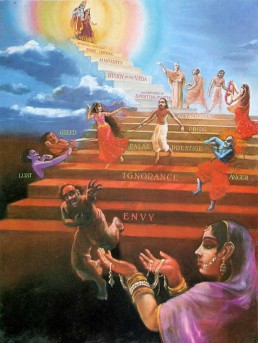
ज्ञानविज्ञानयोग
Jnana Vijnana Yoga - Knowledge of The Ultimate Truth
The middle set of 6 chapters beginning with this one are an exposition of the Supreme Reality and how it seemingly manifests as the world we perceive. Here the Lord describes His so-called lower and higher natures and describes the different types of devotees. Those who are attracted to limited, worldly results which are part of His lower nature are granted those desires by His grace but the few who aspire to His higher nature can achieve oneness with Him. Below are the main themes of Chapter 7:
Verses 1 - 3
Introduction to the knowledge of God and the glory of that knowledge
Verses 4 - 12
Nature of God
Verses 13
Cause of saṃsāra
Verses 14 - 19
Bhakti, the remedy for saṃsāra
Verses 20 - 26
Sakāma-bhakti (devotion for material ends)
Verses 27 - 30
Niṣkāma-bhakti (devotion for spiritual end)
Gita Chapter 7 - 30 Verses
Chapter 7 - 30 Verses
Commentary by Swami Paramarthananda
Background
[In the first six chapters of Gītā, Lord Kṛṣṇa discussed the nature of the individual, karmayoga, etc. predominantly. In the following six chapters, the Lord will predominantly discuss the nature of God, worship of God with attributes (upāsanā), etc. The individual effort was emphasized in the previous section. It will be the grace of the god that will be emphasized hereafter. In short, all these are necessary to achieve the goal of liberation.]
In the first three verses, Kṛṣṇa introduces the topic and its glory. Surrendering to God, whoever worships Him along with His attributes will ultimately discover the attribute-less God (1). The knowledge of God with attributes, as different from oneself is called jñānam, and the knowledge of God as identical with oneself is called vijñānam. This is the highest knowledge because, the intellectual quest of a person finds its fulfillment in this knowledge (2). The very fact that the number of people who attempt and succeed in gaining this knowledge is very small shows the subtlety and rarity of this knowledge (3).
From the 4th to the 11th verse, Kṛṣṇa talks about the nature of God. God has two aspects known as the highest nature (parā-prakṛti) and the lower nature (aparā-prakṛti). The lower nature has eight di-visions — five subtle elements, cosmic ego, cosmic intellect, and the unmanifest (4). [This is called lower because it is changing, inert, finite and dependently existent.] The higher nature is the consciousness be-hind every body and that alone sustains the entire creation (5). [This is called higher because it is changeless, conscious, infinite and indepen-dently existent.] From this God alone comes the entire creation which consists of conscious and inert aspects (jīva and jagat). He alone sus-tains the creation and resolves it (6). In fact there is no creation from Him and He alone is the very essence of everything (7 to 11). Being the material cause of everything, God is independent of everything and everything is dependent on Him (12).
In the 13th verse, the Lord traces the causes of all problems (saṃsāra). Being deluded by the creation which is the product of three guṇas (of aparā-prakṛti) one fails to know the higher nature (parā-prakṛti) of the Lord.
The divine māyā (power of delusion) consisting of three guṇas cannot be conquered by anyone by one’s own effort. Hence the Lord gives the only solution possible — “only those who surrender to me cross over this māyā” (14).
In the next two verses, Kṛṣṇa divides the entire humanity into five groups. The lowliest of those are those non-believers who do not accept or pursue the Lord. Leading a life governed by their own desires and taking to devilish nature, such people are completely lost in māyā. The others, though they are devotees, worship Lord with different attitudes due to different levels of maturity. Thus ārta is one who worships the Lord when he is in distress. Arthārthī is one who worships the Lord for material prosperity. Jijñāsu, who is discriminative enough to discern the limitation of everything else, seeks the Lord through knowledge. Jñānī is one who has reached the destination of his life’s journey by discovering his identity with the Lord (15, 16).
In the next three verses, the Lord talks about the superiority of the wise-devotee. His devotion is permanent and undivided. He loves the Lord has himself because he does not have the dualistic notion. Naturally, the Lord also loves the devotee as Himself (17). Then the Lord promises the highest goal for the wise man of non-dualistic vision [because fullness is possible only in non-duality] (18). Such a vision is achieved by preparing oneself through many births and rare those blessed ones (19).
In the following four verses, the Lord talks about other devotees who worship the Lord but seek various ephemeral ends. They look upon the Lord as the bestower of health, wealth, power, etc., and they seek those ends through rituals and vows (20). Still the Lord, out of compassion, fulfills their prayers (21, 22). But the Lord warns that everything except God is finite (23).
Then the Lord reveals His true nature [which is identical with the seeker’s nature and which is to be gained in terms of knowledge]. He is ever evident, imperishable, unsurpassed (24) and unborn. Still people, deluded by māyā, mistake the Lord as the person subject to birth, etc. (25). Being of the nature of one non-dual awareness, God alone knows everything belonging to the past, present and future. God never becomes the object of knowledge (26).
Concluding this topic, Kṛṣṇa mentions the stages of devotion. Because of the fundamental self-ignorance no one can avoid desires in the initial stages of life. Naturally he will be ārta and arthārthī (27). When he worships the Lord, his mind becomes purified and slowly desires become less. He becomes a jijñāsu (28). Now, his attention turns towards knowledge and he pursues it, surrendering to the Lord. Soon he becomes jñānī knowing all about Brahman, karma, adhyātma, adhibūta, adhidaiva and adhiyajña. [He knows both the parā-prakṛti and aparā-prakṛti of the Lord.] Being established in his knowledge, he does not lose sight of the Lord even at the time of death (29, 30). [Thus jñāni-bhakta enjoys both jīvanmukti and videhamukti.]
The main topics of this chapter are:
- Introduction to the knowledge of God and the glory of that knowledge: 1 to 3
- Nature of God: 4 to 12
- Cause of saṃsāra: 13
- Bhakti, the remedy for saṃsāra: 14 to 19
- Sakāma-bhakti (devotion for material ends): 20 to 26
- Niṣkāma-bhakti (devotion for spiritual end): 27 to 30
Since the knowledge of saguṇa-īśvara (jñānam) and that of nirguṇa-īśvara (vijñānam) are highlighted in this chapter, it is called jñānavijñāna-yoga.

